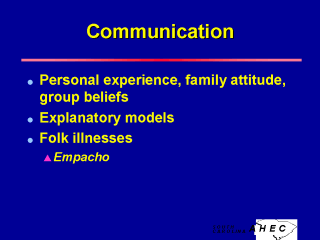| front |1 |2 |3 |4 |5 |6 |7 |8 |9 |10 |11 |12 |13 |14 |15 |16 |17 |18 |19 |20 |21 |22 |23 |24 |25 |26 |27 |28 |29 |30 |31 |32 |33 |34 |35 |36 |37 |38 |39 |review |
 |
Communication: - The relationship between culture and health-related beliefs and behaviors has many aspects. Personal experiences, family attitudes, and group beliefs interact to provide an underlying structure for decision-making during illness. - People in all cultures tend to develop individual conceptualizations of a sickness episode. These explanatory models include beliefs, understandings, and behaviors that specify for an illness episode its etiology, course and timing of symptoms, reasons for becoming sick, diagnosis, methods of treatment, and roles and expectations of the sick individual. - Explanatory models are formed and used to cope with a specific health problem and need to be analyzed in the context of that setting. - In some cases, patientís explanatory models may not fit into any biomedical disease category and are referred to as folk illnesses. One example is empacho, a condition described in various Latino ethnic groups. |